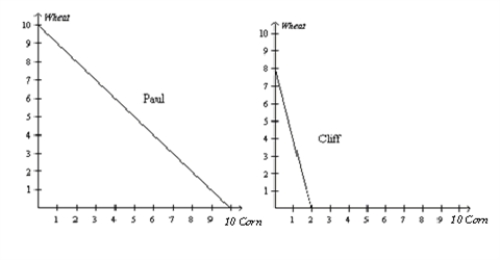Exam 3: Interdependence and the Gains From Trade
Exam 1: Ten Principles of Economics216 Questions
Exam 2: Thinking Like an Economist234 Questions
Exam 3: Interdependence and the Gains From Trade206 Questions
Exam 4: The Market Forces of Supply and Demand349 Questions
Exam 5: Measuring a Nations Income169 Questions
Exam 6: Measuring the Cost of Living181 Questions
Exam 7: Production and Growth191 Questions
Exam 8: Saving, investment, and the Financial System213 Questions
Exam 9: Unemployment and Its Natural Rate197 Questions
Exam 10: The Monetary System204 Questions
Exam 11: Money Growth and Inflation195 Questions
Exam 12: Open-Economy Macroeconomics: Basic Concepts220 Questions
Exam 13: A Macroeconomic Theory of the Small Open Economy196 Questions
Exam 14: Aggregate Demand and Aggregate Supply257 Questions
Exam 15: The Influence of Monetary and Fiscal Policy on Aggregate Demand222 Questions
Exam 16: The Short-Run Tradeoff Between Inflation and Unemployment207 Questions
Exam 17: Five Debates Over Macroeconomic Policy119 Questions
Select questions type
Figure 3-2  -Refer to Figure 3-2.Assume that Cliff and Paul were both producing wheat and corn,and both were dividing their time equally between the two.Then they decide to specialize in the product for which they have a comparative advantage.What would happen to the production of corn?
-Refer to Figure 3-2.Assume that Cliff and Paul were both producing wheat and corn,and both were dividing their time equally between the two.Then they decide to specialize in the product for which they have a comparative advantage.What would happen to the production of corn?
(Multiple Choice)
4.8/5  (23)
(23)
If it takes Canadian workers fewer hours to produce every good than it takes German workers,Canada cannot gain from trade with Germany.
(True/False)
4.8/5  (36)
(36)
What is the term for a good that is produced abroad and sold domestically?
(Multiple Choice)
4.9/5  (45)
(45)
Table 3-1  -Refer to Table 3-1.What is the opportunity cost of 1 kg of meat for the farmer?
-Refer to Table 3-1.What is the opportunity cost of 1 kg of meat for the farmer?
(Multiple Choice)
4.8/5  (34)
(34)
Table 3-5 
-Refer to Table 3-5.Which country has an absolute or comparative advantage in each product?
-Refer to Table 3-5.Which country has an absolute or comparative advantage in each product?
(Multiple Choice)
5.0/5  (31)
(31)
Showing 201 - 206 of 206
Filters
- Essay(0)
- Multiple Choice(0)
- Short Answer(0)
- True False(0)
- Matching(0)